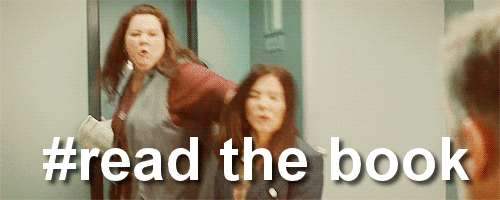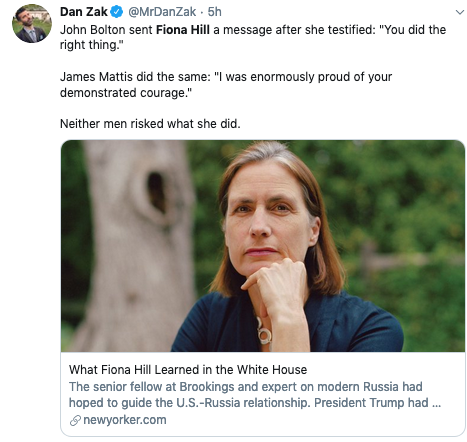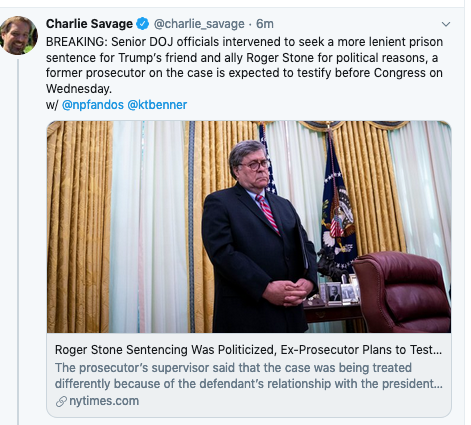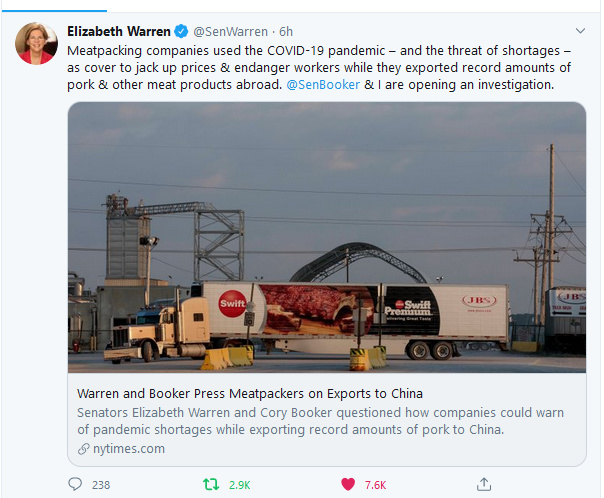Becaue Fiona Hill had come in and testified in front of Congress, am including this extensived article on her in New Yorker coming out today. The exerpt explains the trepidation mostly her friends outside the WH had for her to go into to work with T 'n co on Russian matters.
In February, 2017, Hill attended a dinner hosted by Eliot Cohen, a professor of strategic studies at Johns Hopkins University and an early leader of the conservative “Never Trump” movement. On January 29th, Cohen had published a piece in The Atlantic warning “friends still thinking of serving as political appointees in this administration” that, as he put it, “when you sell your soul to the Devil, he prefers to collect his purchase on the installment plan.” Working for a xenophobic and divisive government, he argued, gave that government legitimacy. At the dinner, he told Hill that she was putting her reputation in jeopardy by working for Trump. Hill had read Cohen’s article, and she told me that she considered it a “powerful warning.” Still, she said, “because of strange quirks of fate, I was the one they asked to step into the fray. What was I going to do? Walk away?”
There were early signs that it might have been wise to do so. On February 28th, Cattler called Hill to tell her that his job had been eliminated. Hill said he warned her, “ ‘Look, you could come in and do the job as you see fit, and succeed. You could come in and be miserable but still feel like you’re making a difference. But you could also come in and be fired. You could be fired capriciously.’ ”
Old acquaintances also pressured Hill to change her mind. On March 8th, before Hill was scheduled to meet with her staff for the first time, she had breakfast with Celeste Wallander, at the Blue Duck Tavern, near Georgetown. Wallander had worked as Obama’s White House adviser on Russia, and she and Hill had crossed paths for more than twenty years. There was clear evidence that Trump and members of his circle had coördinated with the Russians, Wallander said. Trump’s recent attack on NATO as being “obsolete” showed that he intended to do whatever Putin wanted. To work in the Trump Administration was to endorse its policies. “You can’t pick and choose,” Wallander said. “You can’t say, ‘Well, I didn’t support that.’ You own those policies, even if you, on the inside, disagreed with them.” Hill wasn’t persuaded, telling Wallander that the Administration still needed advisers with “no illusions” about Putin to defend against future Russian election meddling. “When your house is on fire, you’ve got to go in and save something,” she said.
Hill’s decision to join the Trump White House was, echoing Samuel Johnson’s assessment of second marriages, a “triumph of hope over experience.” Her detractors called it a triumph of ambition over wisdom. Even Hill’s closest colleagues told me that her stubbornness could work against her. She acknowledged that many of Cohen’s and Wallander’s warnings proved well founded. Little was done to address the threat of future election meddling, and Hill’s tenure was, in many ways, an extended exercise in futility. Ultimately, she will be remembered not for safeguarding the country but for the unvarnished testimony that she delivered in the impeachment proceedings against Trump, in October and November of 2019, which revealed how U.S. foreign policy was subverted for domestic political purposes. In her conversations with me, she offered a unique look at the dysfunction, the misogyny, and the corruption that have proliferated in Trump’s White House. She remained convinced that public service was a necessary and noble calling, but worried that partisan politics was hobbling the country and endangering its security. “We’re doing this to ourselves now,” she said. “The Russians don’t have to do a thing.”








